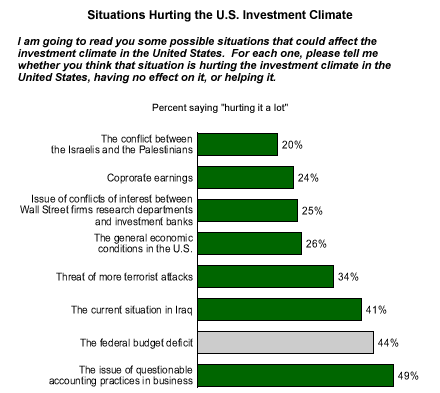Is the federal budget deficit hurting the investment climate? The latest UBS/Gallup Index of Investor Optimism survey* reveals that it's not just a few alarmist economists who are worried about the deficit. According to the November poll, 75% of U.S. investors believe that the federal budget deficit is hurting the investment climate in the country, including 4 in 10 who say it is "hurting a lot." Interestingly, investors view the deficit to be a greater threat to the economy than possible terrorist attacks, corporate profits, or even general economic conditions.

In fact, the deficit is second only to the issue of questionable accounting practices in business, which is uppermost on investors' list of harmful situations. Nearly one of every two investors (49%) believe that questionable accounting practices in business are hurting the investment climate "a lot," compared to 44% of investors who feel this way about the federal budget deficit (another 32% feel that the deficit is hurting the investment climate "a little"). So even though Enron, Tyco, WorldCom, and their ilk have again been filling column space in recent financial news, investors are nearly as concerned with the problem of the ballooning budget deficit.
Twin Deficits and the Weakening Dollar
Last May, billionaire investor George Soros, famous for bringing down the British pound in 1992, went public with his short position on the U.S. dollar. Citing the current administration's shift away from a strong dollar policy in a bid to make American exports competitive, Soros criticized Treasury Secretary John Snow's stance as a "beggar-thy-neighbor" policy, not unlike the competitive devaluations during the post-World War I period that resulted in a global depression. As if to validate Soros' position, the dollar has been depreciating steadily and sank to a record low against major currencies last week.
While geopolitical uncertainties are to blame in some part for the decline of the dollar, the United States' twin budget and trade deficits are another factor contributing to a weakening currency. Historically, budget deficits have been closely linked to wars and recessions, and even as we emerge from a recession and gross domestic product growth shows unprecedented increases, the situation in Iraq and associated spending continues. Last month, the White House announced a federal budget deficit of $374.2 billion in 2003, more than double the deficit posted in 2002.
Bottom Line
Five years ago, the United States accumulated its first budget surplus since 1969, and political debate centered on how best to spend this surplus. But after the Sept. 11 terrorist attacks, a recession, three rounds of tax cuts, and increased military spending, that reality has changed somewhat. It will take tremendous fiscal discipline and strong economic growth to bring the budget into balance again. While the Bush administration has argued that at 3.5% of the GDP, the deficit pales in comparison to its Reagan-era highs of 6%, investors are not convinced. Three-fourths of investors believe that the increasing federal budget deficit is hurting the investment climate to some degree.
*Results for the Index of Investor Optimism -- U.S. are based on telephone interviews with a randomly selected U.S. sample of 801 adult investors, aged 18 and older, with at least $10,000 of investable assets, conducted Nov. 1-13, 2003. For results based on these samples, one can say with 95% confidence that the maximum error attributable to sampling and other random effects is ±4 percentage points. In addition to sampling error, question wording and practical difficulties in conducting surveys can introduce error or bias into the findings of public opinion polls.

